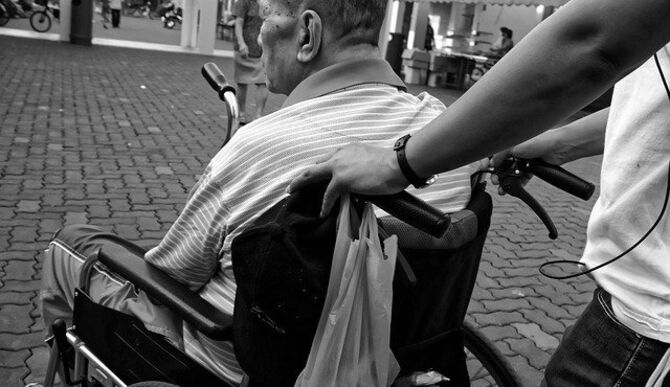COVID-19 highlights working carers’ struggles at work
Shielding and self-isolation have brought the harsh reality of balancing work with caring responsibilities to light for employers of 3.7 million working carers, says a new study from the CIPD and University of Sheffield.

- CIPD Good Work Index: ‘Wellbeing worse even before COVID-19’
- The Flexy-Work Revolution: comparing notes over COVID-19
- One-metre rule poses dilemmas for employers
The cost of caring on carer's wellbeing and careers
Fewer than one in ten (9%) working carers said that paid leave to fulfil caring responsibilities was available to them, despite this being the form of support most desired (40%). Worryingly, 46% of carers had used their own annual leave to provide care, suggesting that some may be missing out on the therapeutic benefits annual leave can provide, putting them at greater risk of burnout.The research shows it is crucial for working carers to receive support from employers. Those who feel supported report better wellbeing and are less likely to consider reducing their hours or quitting their job, potentially with lifelong consequences on careers and income.Among those working in organisations that provided support for working carers, 43% reported high wellbeing, compared with just 31% in organisations considered unsupportive. The research shows that for many people, wellbeing and career are put at risk, as workers suffer in silence.The research further shows:- 30% had reduced the hours they work because of their caring role
- 36% had refused a job offer or promotion, or decided against applying for a job, because of their caring responsibilities
- 28% hadn’t talked to anyone at work about their caring responsibilities. Among them, 39% said this was because they did not believe anything would change
- 60% reported low mental wellbeing, and only 1 in 10 (11%) said combining paid employment with caring had no effect on their levels of stress or anxiety at work.
'An opportunity to be taken, not missed'
Claire McCartney, Senior Resourcing and Inclusion Adviser at the CIPD, said: “Conversations about health conditions and vulnerable household members during the coronavirus crisis mean that employers, some for the first time, are gaining a true understanding of just how many of their employees have caring responsibilities. Others may still be in the dark.“We are urging employers not to miss this opportunity to talk to staff about their caring commitments.“When working carers feel well supported by their employers, they are more likely to experience better wellbeing and are less likely to consider reducing their hours or quitting their job.“Employers can address these issues by making sure they have a clear carer policy or guidance, by supporting flexible working and providing paid carers’ leave.“Line managers need to feel supported to help empower carers to manage their work and caring commitments with simple and practical adjustments. This will not only benefit carers, but also their employers who may otherwise struggle to retain staff or see a drop in productivity.“The Government is consulting on unpaid leave for working carers, but the CIPD is calling for the introduction of an annual entitlement to five days’ statutory paid carers’ leave. Unpaid leave would leave some workers unable to meet financial obligations, and this will go a long way to addressing some of the issues presented in this new report.”Workplace support for carers makes a positive difference
Professor Sue Yeandle, Director of the Centre for International Research on Care, Labour and Equalities [CIRCLE] at The University of Sheffield said: “This is an issue whose time has surely come. The daily struggles faced by employees trying to manage caring alongside jobs and careers are strikingly evident in this report.“The study shows how damaging this can be, both for individuals and for organisations. It also shows, very clearly, that good workplace support really does make a positive difference. It enables working carers to cope, to take fewer days of extra leave, to feel less stressed and healthier and to concentrate better at work.
“It’s time to ensure all employers offer such support, and that every employee can access paid carers’ leave. It makes good sense for business. It makes sound economic sense. And it makes good sense for the individual wellbeing of 3.7 million working carers.”
The CIPD has today launched new guidance on how to become a carer-friendly workplace. It emphasises the importance of having a carer policy, framework or guidance, as well as clear policies around flexible working, line manager support and access to carers’ leave.
Follow for more HR news Relocate Global
Subscribe to Relocate Extra, our monthly newsletter, to get all the latest international assignments and global mobility news.Relocate’s new Global Mobility Toolkit provides free information, practical advice and support for HR, global mobility managers and global teams operating overseas.
 Access hundreds of global services and suppliers in our Online Directory
Access hundreds of global services and suppliers in our Online Directory
©2026 Re:locate magazine, published by Profile Locations, Spray Hill, Hastings Road, Lamberhurst, Kent TN3 8JB. All rights reserved. This publication (or any part thereof) may not be reproduced in any form without the prior written permission of Profile Locations. Profile Locations accepts no liability for the accuracy of the contents or any opinions expressed herein.



































